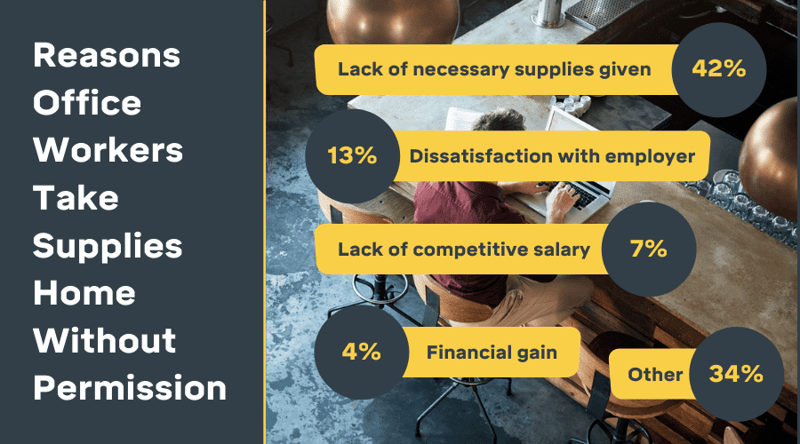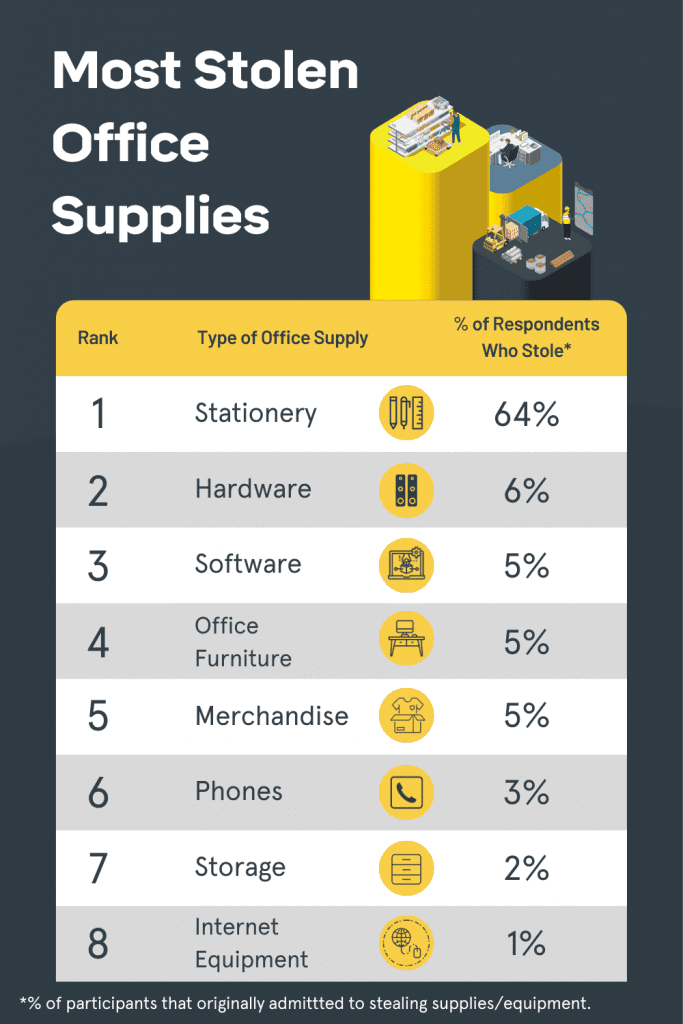Office Supplies Survey: Employee Attitudes to Business Supplies and Equipment
For businesses looking to boost efficiency and cut costs, there are dozens of areas where improvements and refinements can be made. But one area that often goes overlooked is office supplies and equipment – the essentials that keep your business going day to day.
From stationery and furniture to tech and hardware, you rely on all sorts of office supplies and equipment as part of day-to-day operations, but rarely factor these into efficiency-improvement measures. The question is, should you?
To find out, we launched a new survey exploring employee attitudes to office supplies and equipment. We wanted to know how staff view the tools, supplies and equipment they use every day, as well as how likely they are to steal or misuse essential business items.
This article sets out the results of the study, highlighting common attitudes to business supplies while also giving you food for thought on how to better control your operational assets.
Contents
- Office Supplies and Theft: How Big a Problem Is It?
- The What and The Why of Employee Theft
- Are Businesses Taking Supplies Theft Seriously Enough?
- How an Integrated Business Management System Could Help Curb Theft
Office Supplies and Theft: How Big a Problem Is It?
Stationery, hardware, furniture, and equipment; employees use and have access to a plethora of company-owned supplies and equipment while at work, with businesses trusting them to take care of said items – and not steal them.
The problem is, theft is more commonplace than you might expect, with 39% of workers admitting to taking supplies and equipment without permission. That represents a huge chunk of the British workforce, with over 10 million guilty of stealing from their place of business.

Of course, most companies wouldn’t begrudge their staff taking everyday supplies, like stationery. But even then, the cost of loss can be sizeable, with our study revealing that British businesses lose an average of over £183 million each year as a direct result of employee theft.
So, the accumulative impact of lost office supplies can be huge. And with the ongoing coronavirus pandemic forcing businesses to transform their working practices, instances of theft and loss may be on the rise, as physical assets become more difficult to trace and monitor.
Office Supply Theft in Ireland
According to findings from the Irish SME Association in 2020, 16% of businesses reported theft by members of staff. Figures also showed that ‘theft by staff members’ is most common in the wholesale sector, at 43%.
The construction and retail sectors were the next most affected, with 33% and 29% respectively reporting incidents of theft by staff members in 2020. Reassuringly, the Irish manufacturing industry recorded zero incidences of theft by staff members in 2020.
It is also reassuring to see that the total figures were exactly the same as the last time this survey was carried out in 2017, demonstrating that there isn’t a surge in theft by staff or any worrying patterns to consider.
The What and The Why of Employee Theft
Employee theft may be a bigger issue than many business leaders realise, but what’s driving it? And what items are the most likely to go missing from a company’s inventory?
As part of our study, we were keen to investigate the reasons why an employee might take supplies and equipment without permission. After all, most normal working people are not criminals, so what’s the reasoning behind their willingness to take items from their place of work?
The following graphic illustrates the principal reasons those surveyed had for taking supplies home without permission.

While ‘other’ accounted for over a third of responses, there were some interesting results from this survey question.
Firstly, it was startling to see that over two-fifths of workers take supplies because they feel their employer hasn’t offered adequate provision. Such findings are indicative of a broader trend intensified by the pandemic, wherein many UK workers feel they don’t have the necessary tools and supplies to work from home effectively.
With over 40% of employees citing this as their reason to take office supplies, it may serve as a wake-up call to businesses to evaluate and audit their supplies and equipment infrastructure – ensuring that every member of staff has the tools they need to succeed.
Elsewhere, ‘dissatisfaction with employer’ was the second-most popular reason for taking office supplies, which could, again, suggest that employers need to closely monitor their supply levels, as well as the morale and concerns of their staff. ‘Lack of competitive salary’ also accounted for several instances of theft, though this motive is more difficult to explain and justify.
As well as the reasoning behind employee supply theft, we were also keen to learn more about the types of items and equipment that are more commonly lost from the workplace.
Asking respondents to select the items they would admit to stealing from the office, these were our findings…

As you might expect, stationery accounted for the topmost supplies likely to go missing from the office, with almost two-thirds of respondents admitting to taking items like notepads and pens.
Meanwhile, just 6% of employees admitted to taking hardware, which is good news for businesses who have entrusted expensive equipment into the hands of their staff. Likewise, only 5% have previously stolen software, which, on the surface at least, is a relatively low number.
Given the seriousness of these types of thefts, however, it’s still important that businesses do all they can to prevent the loss of equipment, hardware, and software. Remember, it isn’t just the monetary loss that you need to contend with; the loss of hardware and software could also have lasting repercussions for the safety and integrity of your data, with the potential for sensitive information to fall into the wrong hands.
Are Businesses Taking Supplies Theft Seriously Enough?
Given that most instances of supplies-related theft concern stationery items such as pens and notepads, employers may not view it as a significant problem. But it’s worth reiterating the potential for losses that can occur because of employee theft, with British businesses standing to lose millions each year.
Remember, too, that employee theft may be indicative of broader, endemic problems within your business. From a basic lack of supplies to questions over fair pay and treatment, investigating instances of theft could help your business improve its practices and working conditions – making it a happier and more supportive environment for everyone.
![]()
For firms looking to cut costs and increase efficiencies, getting to the root cause of theft, and putting a stop to it, could pay dividends. But with our survey revealing that over 50% of employers don’t have a system for tracking supplies and equipment, it’s clear that more businesses need to strengthen how they manage and monitor their day-to-day supplies by utilising the right systems and software.
How an Integrated Business Management System Could Help Curb Theft
With a huge number of businesses lacking the basic means of monitoring supplies and equipment, it’s worth touching on the value an integrated business management system can offer in this regard.
While the main purpose or priority of an ERP system may not be to monitor office supplies, such a system can make light work of this basic operational task. With internal personnel able to create a centralised database, it’s easy to track, monitor and audit supplies and equipment, which ultimately improves accountability while making it easy to spot any gaps in your supply.
Intact is a specialist provider of future-aligned business management software, bringing you the tools and expertise you need to elevate and strengthen every aspect of your business. For more information or to learn more about our services, visit the homepage or contact us today.






